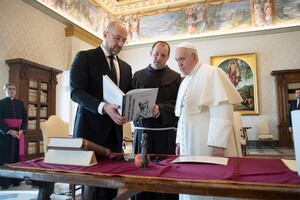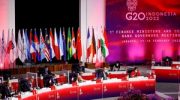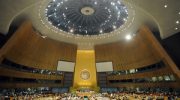“The earliest statements [about the war] were extremely vague. For example, when the pope condemned nationalism in early April, it could often be seen by the Russian side as a symbol of Ukrainian nationalism. It may not have been his will, but the vagueness allowed such an interpretation has been criticized by many Ukrainians. ”

The Vatican is already insufficiently knowledgeable for war analysis, similar to the one currently unfolding on Ukrainian soil. This explains the ambiguity of the Pope in this matter. This opinion was expressed by political scientist Francois Mabil in an interview with Le Monde regarding the public attitude of leading religious figures to the Kremlin's war against Ukraine.
Francis' position on the war in Ukraine is not easy to interpret. On the one hand, he shows his support for “war-torn Ukraine”, a victim of “barbaric and blasphemous actions”, on the other – he condemns “NATO's barking” on the border with Russia and refuses to unequivocally identify the aggressor. François Mabil is director of the Geopolitical Religious Observatory at the Institute for International and Strategic Relations. He edited the book La Longue Transition du Catholicisme. Government and Influence (Editions du Cygne, 2014) and is the author of the book “Catholics and Peace during the Cold War” (L'Harmattan, 2004).
Read also: Bloomberg: The war in Ukraine may end as in Korea or Finland
When asked “How would you describe the pope's position since the beginning of the war?”, Mabil said:
“I would say he is first and foremost a pacifist. According to his encyclical Fratelli tutti (2020), Francis has long stated that he is hostile to any use of weapons (whether by Ukraine or Russia). Paragraph 258 is critically questionable. the very notion of “just war”, given that “just war” or self-defense of the armed forces is no longer possible due to the nature of the weapon itself …. The Holy See's diplomacy towards Ukraine can be described as “humanitarian-pastoral”. > Read also: Ukrainian and Russian took part in the procession, but the Vatican canceled the speech about “brotherly nations”
In addition, the Pope's position is based on the interests of the Holy See. Of course, there is a will to achieve peace. But there is also a desire to maintain good relations with the Kremlin through, for example, a possible trip to Russia, and to maintain, in addition, satisfactory relations with Moscow Patriarch Kirill. It seems to me that the Pope's position is linked to this important issue of Vatican policy. ” strong>Bishop Paul Gallagher, the Vatican's secretary for relations with other nations. He said on Italian television in mid-May that “Ukraine has the right to defend itself and needs weapons.” But at the same time, the Vatican refused to accept arms supplies to Ukraine. For example, when the pope condemned nationalism in early April, it could often be seen by Russia as a sign of Ukrainian nationalism. It may not have been his will, but the vagueness of the statements allowed for such an interpretation and was criticized by many Ukrainians. ” The director of the Geopolitical Religious Observatory said in an interview.
It will be recalled that this month the Pope met with the wives of the defenders of Mariupol, Kateryna Prokopenko and Yulia Fedosyuk. Earlier, Ukrainian women wrote him a letter and received an invitation to come to the Vatican.


